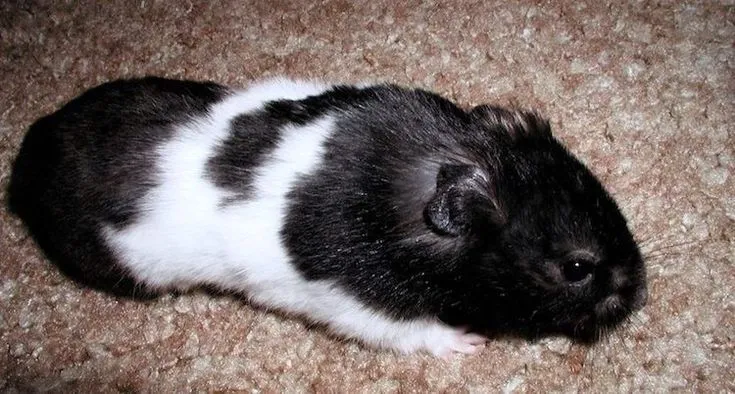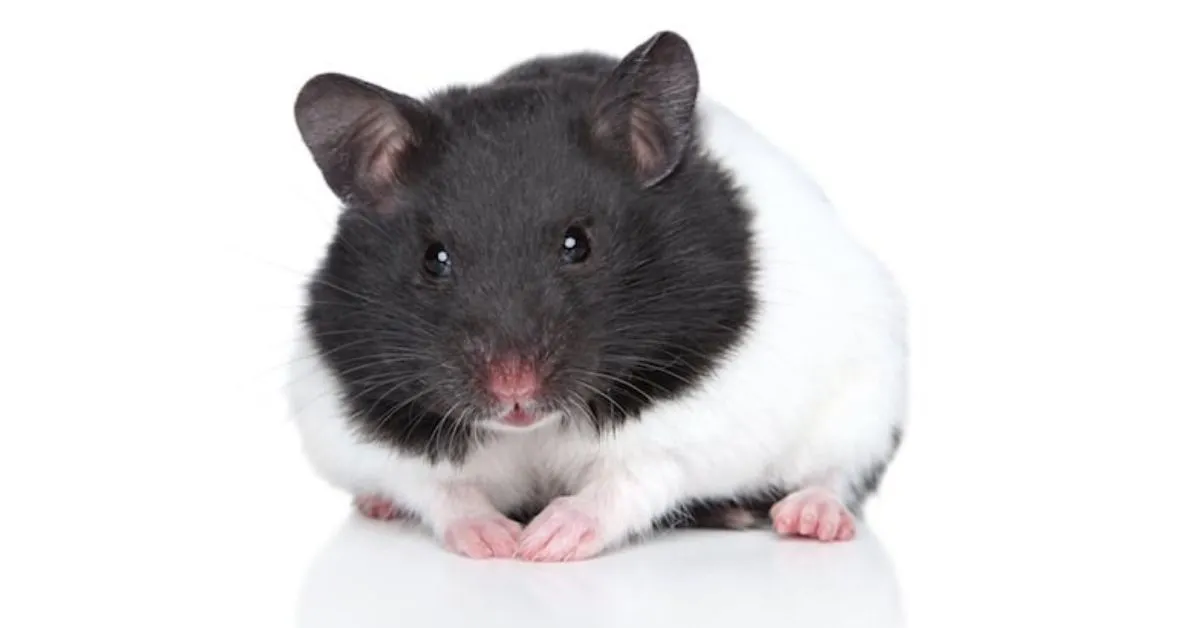Panda Bear Hamster
Panda bear hamsters are very cute and are mostly kept as pets in homes. They look like Syrian hamsters because their body is white. There are golden spots on it, and some hamsters and panda bears are similar to them. People started choosing hamsters that were white and black. Its unique color has attracted people a lot. They are found in Asia, Europe, and the United States and are known to be very interesting animals for people.
Further Insights and Relevant Content About Hamsters.

Characteristics of Panda Bear Hamster
| Name | Panda Bear Hamster |
| Age | 2 to 3 years |
| Size | 5 to 7 inches |
| Diet | Fruits,insects, Vegetables |
| Color | Black or dark brown patches with white or cream-colored fur |
| Weight | 150 to 200 grams |
| Temperament | Active at Night |
Panda Bear Hamster Physical Description
They are known for their wonderful features and coat patterns. Because it imitates the black-and-white coloring of the panda bear, the appearance of these hamsters can be different from each other, but they have some things in common. They have a white body with black spots on it. The body size is five to seven inches and they are similar to each other. Their weight is between 150 to 200 grams, and their eyes are big which makes them more attractive, besides their ears and moon are dark in color while the rest of the body looks white.
Food and Diet of Panda Bear Hamster
It is important to give them a nutritious and good diet so that they can maintain their health in a good way and not face any kind of problems. Also never feed them food that is problematic for them such as chocolates all of which can be painful for them and can have a significant impact on their health such as They may become obese Also, you can feed them them fresh fruits and vegetables like apples, carrots, and spinach, which are very beneficial for them, keeping them happy and healthy, apart from helping them digest their food and making them feel better. Regular exercise is essential to stay good.

The Behavior of Panda Bear Hamster
These hamsters are very well-tempered. They are known for being solitary and territorial creatures. They generally do not enjoy the company of other hamsters. There can be a fight between them They are mostly active at night. Also, people like to keep them as pets in their homes because they are so cute and you can get tired of them because they can be naughty but you have to handle them gently they A play cage should also be provided so that they can chew and enjoy it easily and an exercise wheel should also be available in their living space.
Housing For Panda Bear Hamster
Cage Size
Their living space should be such that they can walk around easily and it should also provide enough space for exercise.The size of their cage should be around 3 to 4 feet, a larger cage is preferred as they can live comfortably in it.
Bedding
Provide them with soft bedding material that can be paper-based and avoid wall coverings as they emit oils that can be quite harmful to them.
Temperature
It is very important to maintain the temperature in their living space, not keep them in direct sunlight which can be harmful to them, and also keep the humidity level in their living space below 50 percent. The heating should be between 70 and 75F.
Cleaning
It is very important to keep them clean as its good for their health.To remove the dishes they are given to eat on a daily basis, their cages should be washed once a week to keep them healthy and not prone to any diseases.
Common Health Problems of Panda Bear Hamster
They can get many diseases if they are not taken care of properly. To keep them healthy, their living space must be good and they must be fed on time. Besides, they can have respiratory problems, skin rashes, and more. Many problems can be faced if their food does not improve, they can have a lot of digestive problems due to which their eyes start to water, in this case, you should consult your doctors. It should be kept in a clean environment.
Handling and Care Tips
They live together with humans so you should take good care of them. Be very gentle with them at first so that they get used to you. Support them with both hands.They should not be scared because they can be aggressive. Keep toys in their cage for them to play with and chew on. An exercise wheel is also a must in their living space.
Breeding of Panda Bear Hamster
Their breeding process is very interesting which is very beneficial for them and their babies. You should keep the male and female together during their breeding period. It is a day old and can produce two to three litters per year. The young can be born blind and have no hair. They also grow very quickly and last five to six weeks. They start walking and it is very important to take good care of their food.
Lifespan
In captivity
If they are well cared for, they can live for two to three years because here they do not face any kind of problems and are given good food.
In the Wild
In addition, they live for one to two years in the forest because there they can face a lot of problems, they do not get good food and there is also a risk of predators.
Price And Cost
The amount of a small baby is 10 to 15$ because they are very difficult to handle,the price of a juvenile is between 15 to 30 dollars, while the price of an adult is 30 to 40$ they can be handled easily.
Conclusion
Panda Bear Hamsters live in Europe and the United Arab Emirates. No, but these hamsters are very attractive because they are similar in color to each other. It is important to give them good food so that they can stay healthy, they can have many diseases like teething, lethargy, respiratory infections, etc. Apart from that they can live for two to three years if they are well taken care of, while in the forests they are also at risk of predators, where they live for one to two years.







